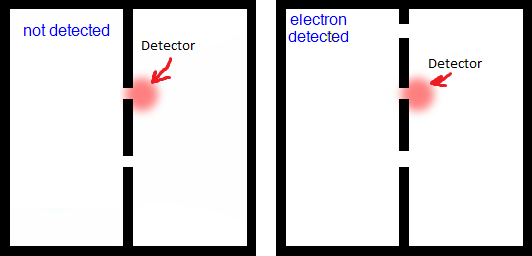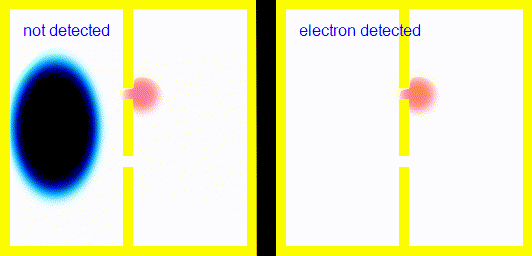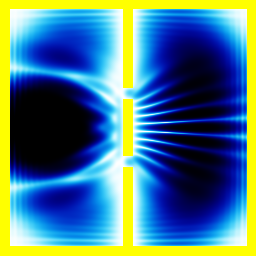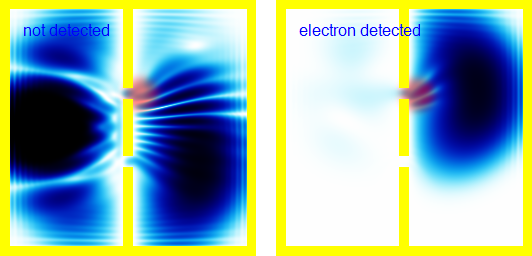Point 5: The double slit experiment with an electron and a detector
Here's the experiment now:- One electron. It starts in the left hand side, moving to the right.
- One arena. It doesn't change. Or, arguably, two arenas, representing the case of no detection and detection.
- One detector. It is initially "off". When an electron is nearby, it flips on, and sometimes back off.

As for the ball, the detector works as follows: If the electron is near enough to the detector, probability is transferred from the left, electron-undetected, arena, to the right, electron-detected, arena (and vice versa).
Here goes:
 At first glance, the situation with and without the detector both look similar, but let's look at frame 150:
No Detector:
At first glance, the situation with and without the detector both look similar, but let's look at frame 150:
No Detector:
 Yes Detector:
Yes Detector:
 You can see here that if an electron is detected (right hand arena), there's no diffraction pattern.
If an electron is not detected, there's a slight interference pattern, but it's much less than if there was no detector. That's because we're only interfering two
possible things: (1) The electron went through the lower slit. (2) The electron went through the upper slit, but somehow escaped detection.
Because the detector is reasonably
likely to detect the electron, the two things we're interfering aren't equally probable. And that lack of equally-probableness
is something that reduces the interference pattern.
You can see here that if an electron is detected (right hand arena), there's no diffraction pattern.
If an electron is not detected, there's a slight interference pattern, but it's much less than if there was no detector. That's because we're only interfering two
possible things: (1) The electron went through the lower slit. (2) The electron went through the upper slit, but somehow escaped detection.
Because the detector is reasonably
likely to detect the electron, the two things we're interfering aren't equally probable. And that lack of equally-probableness
is something that reduces the interference pattern.
Philosophical stuff
From here on, it's just a discussion of the philosophy of the matter. If you're not interested, congratulations, you've reached the end. The fact that we have an interference pattern, and it goes away if we know which slit it goes through leads us to a conclusion (not unavoidably, but suggestively): The electron travels through both slits. Any "simple" truth, such as "the electron went through the lower slit", is wrong, or at least incomplete. At least on a microscopic level, both possible scenarios must have played out because the interference pattern needed a contribution from both slits.What about consciousness?
Well ... the detector could have been a person who looks for electrons nearby. It would have only been slightly different: The simulated electron detector flips between yes detection and no detection when in the presence of an electron, whereas a human would not be able to forget that they'd seen an electron. Nevertheless, the simulation would be largely the same. This, so far, means that consciousness can fit into quantum mechanics seamlessly, and without causing a collapse of the wavefunction in any way. Conclusion: Consciousness doesn't necessarily cause a wavefunction collapse.Maybe the wavefunction collapses anyway.
Yes, just because we can put consciousness in our picture of the world without it causing a wavefunction collapse, doesn't mean that all possible outcomes actually happen.However, the Schrödinger equation, which has been experimentally verified, doesn't have anything in it which causes the wavefunction to collapse. Put another way, if the Schrödinger equation is all there is, all possible universes just carry on going. So in some ways, assuming that all possible scenarios play out in some way, for ever, is the default position.
Doesn't that raise problems?
Yes, if you say that the wavefunction never collapses, and you think that the wavefunction is "real", whatever that means, then you're more-or-less forced into a many-worlds view of Quantum mechanics: The electron is now either detected or not, and both scenarios play out until the end of the universe or for eternity (whichever is sooner), but in different parts of an increasingly complicated arena. So what? The problem with this is that that means that every decision you made as a kid was played out in a different part of the universal wavefunction. And many people find that "absurd": common sense says that only one possibility actually happened - the other possibilities are just hypothetical but didn't actually happen. If we assume that common sense is *always* correct when it makes unverifiable statements about quantum mechanics, then we have a problem. The ways round this really fall into two categories:- You could say that there's a true wavefunction collapse. At some point, the wavefunction gets almost rounded or at least suppressed for cases that are far from our here-and-now reality.
- The other way to get around this problem is to say that the wavefunction never really collapses, but only one point or one region or something is "real". For instance, the waveguide theories say that although the universal wavefunction contains all the branches of what could have happened, only one point on that is "real", and the others are just a mathematical curiosity.
Fine, we'll just say that the wavefunction collapses - that at some point one reality is chosen as the real reality, and the probabilities of the others fade to zero.
The problem is that this would be nightmarishly difficult to describe mathematically: There are all sorts of conservation laws and symmetries that quantum mechanics has to obey (because experiment shows that there are these conservation laws and symmetries), and that makes it virtually impossible to find a satisfactory model for how the wavefunction might "choose" one possible universe to be more real than the other possible universe. Also, if there's really a wavefunction collapse, we may be able to detect it experimentally. This actually makes this different from the other interpretations - you could devise a huge double slit (much bigger than the earth, with zero light) that people would be diffracted through, and you could see if there's still an interference pattern. An actual, physical, collapse is often considered an interpretation of quantum mechanics, but some forms of it are actually a testably different theory that has yet to be verified or falsified.
So ... what's the answer.
These questions really are hard to answer - some people think it's a real problem and it makes them doubt all of quantum mechanics - a view I consider a bit unthinking. Some people think that it's not a problem: A sentence is only really meaningful if it conveys a statement that can be falsified experimentally, and wavefunction collapse can't be falsified experimentally, so this question is a non-problem. They're basically saying (and I largely agree), that the difference between the many-worlds universe and the common sense universe is only a language game. It's like one person saying that the sky is blue, and another saying that the sky is bleu.Lots more people just say that surely one interpretation is "correct", and the others "incorrect", but they don't know which, or they do think they know (for philosophical or religious reasons which are typically not universally convincing) which is correct. At the end of the day, no experiment can tell whether these alternate possibilities are real at macroscopic levels, so it's really a matter of personal preference. Personally, I prefer the many worlds interpretation, but I agree that it's not really a meaningful question. All you need is the Schrödinger equation, and that's the only thing we can check experimentally.
© Hugo2015. Session @sessionNumber